Solana Wallet Balance Agent
This guide demonstrates how to create a Solana Wallet Balance Agent that can check wallet balances using the Solana RPC API. The agent is compatible with ASI1 LLM and can process natural language queries about Solana wallet balances.
Overview
The Solana Wallet Balance Agent allows users to query wallet balances using natural language. It uses the Solana RPC API to fetch real-time balance information and provides formatted responses with both SOL and lamports values.
Message Flow
The communication flow between ASI1 LLM, the Solana Wallet Agent, and OpenAI Agent follows this sequence:
-
Query Initiation (1.1)
- ASI1 LLM sends a natural language query (e.g., "What's the balance of wallet address AtTjQKXo1CYTa2MuxPARtr382ZyhPU5YX4wMMpvaa1oy") as a
ChatMessageto the Solana Wallet Agent.
- ASI1 LLM sends a natural language query (e.g., "What's the balance of wallet address AtTjQKXo1CYTa2MuxPARtr382ZyhPU5YX4wMMpvaa1oy") as a
-
Parameter Extraction (2, 3)
- The Solana Wallet Agent forwards the query to OpenAI Agent for parameter extraction
- OpenAI Agent processes the natural language and extracts the wallet address
- The address is returned in a Pydantic Model format as
StructuredOutputResponse
-
Balance Query (4, 5)
- The Solana Wallet Agent calls the
get_balance_from_addressfunction with the extracted address - The function queries the Solana RPC API and returns the balance information
- The Solana Wallet Agent calls the
-
Agent Response (6.1)
- The Solana Wallet Agent sends the formatted response back as a
ChatMessageto ASI1 LLM
- The Solana Wallet Agent sends the formatted response back as a
-
Message Acknowledgements (1.2, 6.2)
- Each message is acknowledged using
ChatAcknowledgement
- Each message is acknowledged using
Here's a visual representation of the flow:
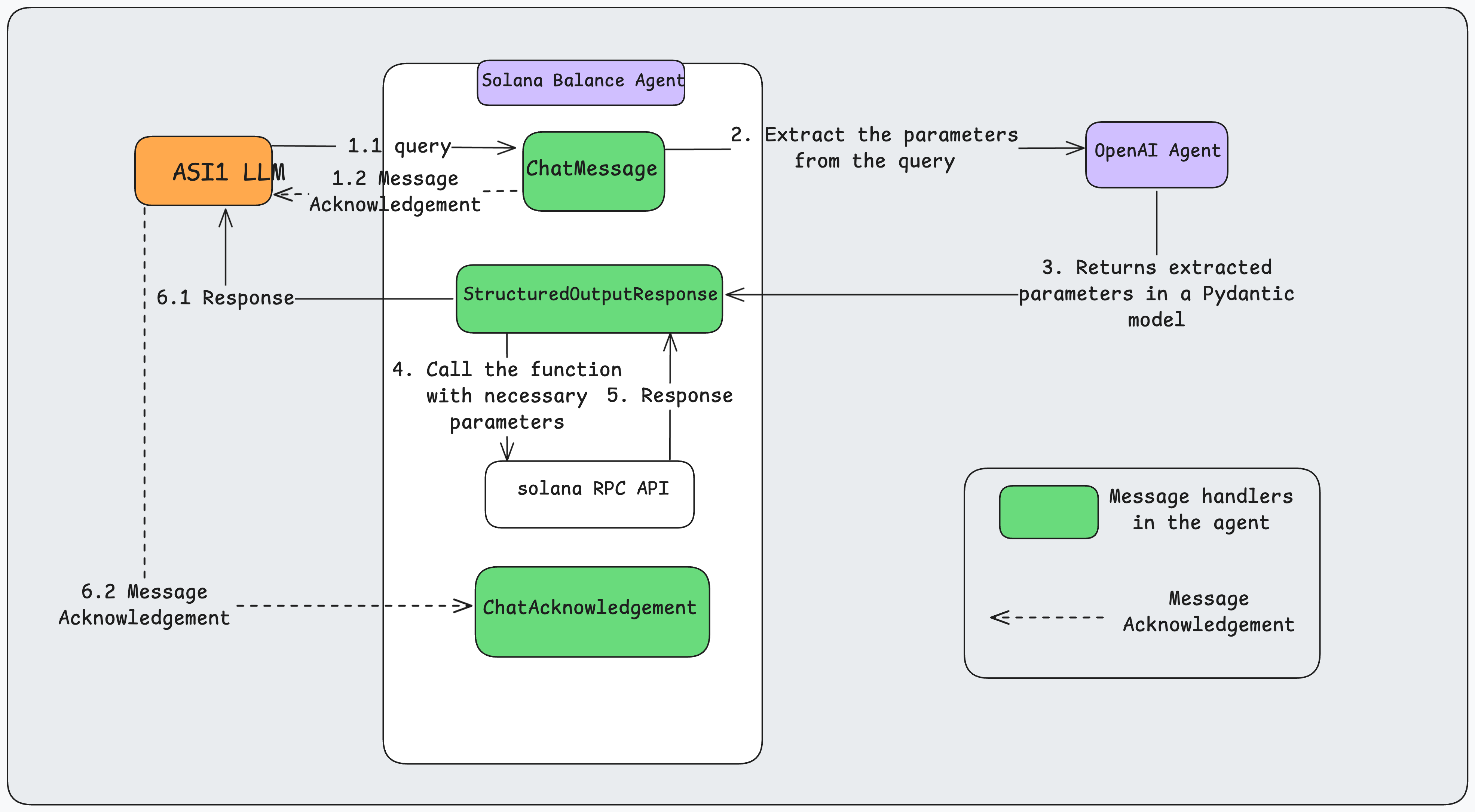
Implementation
In this example we will create an agent and its associated files on Agentverse that communicate using the chat protocol with the ASI1 LLM. Refer to the Hosted Agents section to understand the detailed steps for agent creation on Agentverse.
Create a new agent named "SolanaWalletAgent" on Agentverse and create the following files:
agent.py # Main agent file with integrated chat protocol and message handlers for ChatMessage and ChatAcknowledgement
solana_service.py # Solana RPC API integration
To create a new file on Agentverse:
- Click on the New File icon

- Assign a name to the File
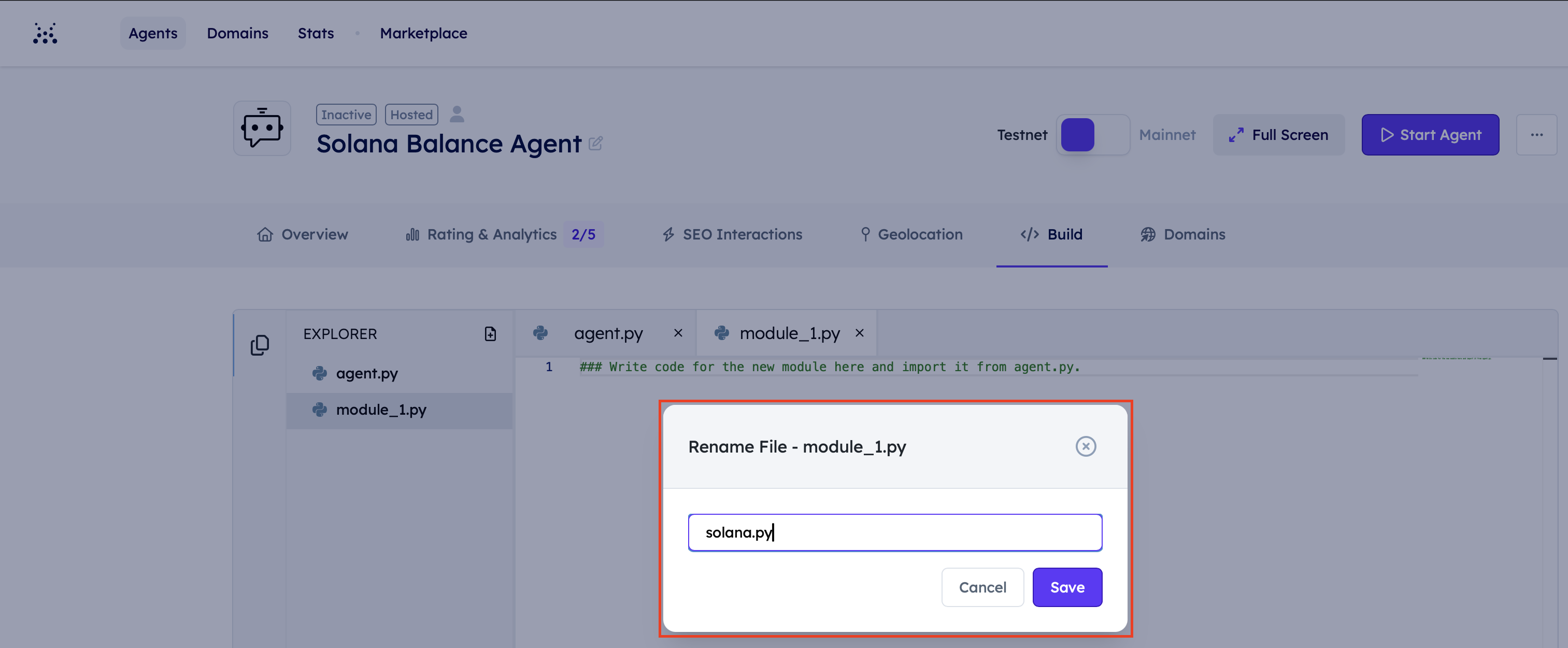
- Directory Structure

1. Solana Service Implementation
The solana_service.py file handles the interaction with the Solana RPC API:
import os
import logging
import requests
import json
from uagents import Model, Field
# Configure logging
logging.basicConfig(level=logging.INFO)
logger = logging.getLogger(__name__)
# Solana RPC endpoint
SOLANA_RPC_URL = "https://api.mainnet-beta.solana.com"
class SolanaRequest(Model):
address: str = Field(
description="Solana wallet address to check",
)
class SolanaResponse(Model):
balance: str = Field(
description="Formatted Solana wallet balance",
)
async def get_balance_from_address(address: str) -> str:
"""
Get the balance for a Solana address using the Solana RPC API
Args:
address: Solana wallet address
Returns:
Formatted balance string
"""
try:
logger.info(f"Getting balance for address: {address}")
# Prepare the request payload
payload = {
"jsonrpc": "2.0",
"id": 1,
"method": "getBalance",
"params": [address]
}
# Set headers
headers = {
"Content-Type": "application/json"
}
# Make the API request
response = requests.post(SOLANA_RPC_URL, headers=headers, json=payload)
response.raise_for_status()
# Parse the response
result = response.json()
if "error" in result:
error_msg = f"Error: {result['error']['message']}"
logger.error(error_msg)
return error_msg
if "result" in result and "value" in result["result"]:
# Convert lamports to SOL (1 SOL = 1,000,000,000 lamports)
lamports = result["result"]["value"]
sol_balance = lamports / 1_000_000_000
# Format the result
result_str = f"{sol_balance:.9f} SOL ({lamports} lamports)"
logger.info(f"Balance for {address}: {result_str}")
return result_str
else:
error_msg = "No balance information found"
logger.error(error_msg)
return error_msg
except requests.exceptions.RequestException as e:
error_msg = f"Request error: {str(e)}"
logger.error(error_msg)
return error_msg
except json.JSONDecodeError as e:
error_msg = f"JSON decode error: {str(e)}"
logger.error(error_msg)
return error_msg
except Exception as e:
error_msg = f"Unexpected error: {str(e)}"
logger.error(error_msg)
return error_msg
2. Solana Wallet Agent Setup
The agent.py file is the core of your application with integrated chat protocol functionality and contains message handlers for ChatMessage and ChatAcknowledgement protocols. Think of it as the main control center that:
- Handles message handlers for
ChatMessageandChatAcknowledgementprotocols - Processes natural language queries using integrated chat protocol
import os
from enum import Enum
from datetime import datetime, timezone
from uuid import uuid4
from typing import Any
from uagents import Agent, Context, Model, Protocol
from uagents.experimental.quota import QuotaProtocol, RateLimit
from uagents_core.models import ErrorMessage
# Import chat protocol components
from uagents_core.contrib.protocols.chat import (
chat_protocol_spec,
ChatMessage,
ChatAcknowledgement,
TextContent,
EndSessionContent,
StartSessionContent,
)
from solana_service import get_balance_from_address, SolanaRequest, SolanaResponse
agent = Agent()
# AI Agent for structured output (choose one)
AI_AGENT_ADDRESS = 'agent1q0h70caed8ax769shpemapzkyk65uscw4xwk6dc4t3emvp5jdcvqs9xs32y' # OpenAI Agent
# AI_AGENT_ADDRESS = 'agent1qvk7q2av3e2y5gf5s90nfzkc8a48q3wdqeevwrtgqfdl0k78rspd6f2l4dx' # Claude Agent
if not AI_AGENT_ADDRESS:
raise ValueError("AI_AGENT_ADDRESS not set")
# Create the chat protocol
chat_proto = Protocol(spec=chat_protocol_spec)
# Create structured output protocol
struct_output_client_proto = Protocol(
name="StructuredOutputClientProtocol", version="0.1.0"
)
# Structured output models
class StructuredOutputPrompt(Model):
prompt: str
output_schema: dict[str, Any]
class StructuredOutputResponse(Model):
output: dict[str, Any]
def create_text_chat(text: str, end_session: bool = True) -> ChatMessage:
content = [TextContent(type="text", text=text)]
if end_session:
content.append(EndSessionContent(type="end-session"))
return ChatMessage(
timestamp=datetime.now(timezone.utc),
msg_id=uuid4(),
content=content,
)
# Chat protocol message handler
@chat_proto.on_message(ChatMessage)
async def handle_message(ctx: Context, sender: str, msg: ChatMessage):
ctx.logger.info(f"Got a message from {sender}: {msg.content}")
ctx.storage.set(str(ctx.session), sender)
# Send acknowledgement
await ctx.send(
sender,
ChatAcknowledgement(
acknowledged_msg_id=msg.msg_id,
timestamp=datetime.now(timezone.utc)
),
)
# Process message content
for content in msg.content:
if isinstance(content, StartSessionContent):
ctx.logger.info(f"Got a start session message from {sender}")
continue
elif isinstance(content, TextContent):
ctx.logger.info(f"Got a message from {sender}: {content.text}")
ctx.storage.set(str(ctx.session), sender)
# Send to AI agent for structured output extraction
await ctx.send(
AI_AGENT_ADDRESS,
StructuredOutputPrompt(
prompt=content.text,
output_schema=SolanaRequest.schema()
),
)
else:
ctx.logger.info(f"Got unexpected content from {sender}")
# Handle structured output response from AI agent
@struct_output_client_proto.on_message(StructuredOutputResponse)
async def handle_structured_output_response(
ctx: Context, sender: str, msg: StructuredOutputResponse
):
session_sender = ctx.storage.get(str(ctx.session))
if session_sender is None:
ctx.logger.error(
"Discarding message because no session sender found in storage"
)
return
if "<UNKNOWN>" in str(msg.output):
await ctx.send(
session_sender,
create_text_chat(
"Sorry, I couldn't process your request. Please include a valid Solana wallet address."
),
)
return
try:
# Parse the structured output to get the address
wallet_request = SolanaRequest.parse_obj(msg.output)
address = wallet_request.address
if not address:
await ctx.send(
session_sender,
create_text_chat(
"Sorry, I couldn't find a valid Solana wallet address in your query."
),
)
return
# Get the balance for this address
balance = await get_balance_from_address(address)
# Create a nicely formatted response
response_text = f"Wallet Balance for `{address}`:\n{balance}\n\n[View on Solana Explorer](https://explorer.solana.com/address/{address})"
# Send the response back to the user
await ctx.send(session_sender, create_text_chat(response_text))
except Exception as err:
ctx.logger.error(f"Error processing structured output: {err}")
await ctx.send(
session_sender,
create_text_chat(
"Sorry, I couldn't check the wallet balance. Please try again later."
),
)
# Chat protocol acknowledgement handler
@chat_proto.on_message(ChatAcknowledgement)
async def handle_ack(ctx: Context, sender: str, msg: ChatAcknowledgement):
ctx.logger.info(
f"Got an acknowledgement from {sender} for {msg.acknowledged_msg_id}"
)
# Optional: Rate limiting protocol for direct requests
proto = QuotaProtocol(
storage_reference=agent.storage,
name="Solana-Wallet-Protocol",
version="0.1.0",
default_rate_limit=RateLimit(window_size_minutes=60, max_requests=30),
)
# Optional: Direct request handler for structured requests
@proto.on_message(SolanaRequest, replies={SolanaResponse, ErrorMessage})
async def handle_request(ctx: Context, sender: str, msg: SolanaRequest):
ctx.logger.info(f"Received wallet balance request for address: {msg.address}")
try:
balance = await get_balance_from_address(msg.address)
ctx.logger.info(f"Successfully fetched wallet balance for {msg.address}")
await ctx.send(sender, SolanaResponse(balance=balance))
except Exception as err:
ctx.logger.error(err)
await ctx.send(sender, ErrorMessage(error=str(err)))
# Optional: Health check related code
def agent_is_healthy() -> bool:
"""
Implement the actual health check logic here.
For example, check if the agent can connect to the Solana RPC API.
"""
try:
import asyncio
asyncio.run(get_balance_from_address("AtTjQKXo1CYTa2MuxPARtr382ZyhPU5YX4wMMpvaa1oy"))
return True
except Exception:
return False
class HealthCheck(Model):
pass
class HealthStatus(str, Enum):
HEALTHY = "healthy"
UNHEALTHY = "unhealthy"
class AgentHealth(Model):
agent_name: str
status: HealthStatus
health_protocol = QuotaProtocol(
storage_reference=agent.storage, name="HealthProtocol", version="0.1.0"
)
@health_protocol.on_message(HealthCheck, replies={AgentHealth})
async def handle_health_check(ctx: Context, sender: str, msg: HealthCheck):
status = HealthStatus.UNHEALTHY
try:
if agent_is_healthy():
status = HealthStatus.HEALTHY
except Exception as err:
ctx.logger.error(err)
finally:
await ctx.send(sender, AgentHealth(agent_name="solana_wallet_agent", status=status))
# Register protocols
agent.include(chat_proto, publish_manifest=True)
agent.include(struct_output_client_proto, publish_manifest=True)
agent.include(proto, publish_manifest=True)
agent.include(health_protocol, publish_manifest=True)
if __name__ == "__main__":
agent.run()
Adding a README to your Agent
-
Go to the Overview section in the Editor.
-
Click on Edit and add a good description for your Agent so that it can be easily searchable by the ASI1 LLM. Please refer the Importance of Good Readme section for more details.
-
Make sure the Agent has the right
AgentChatProtocol.
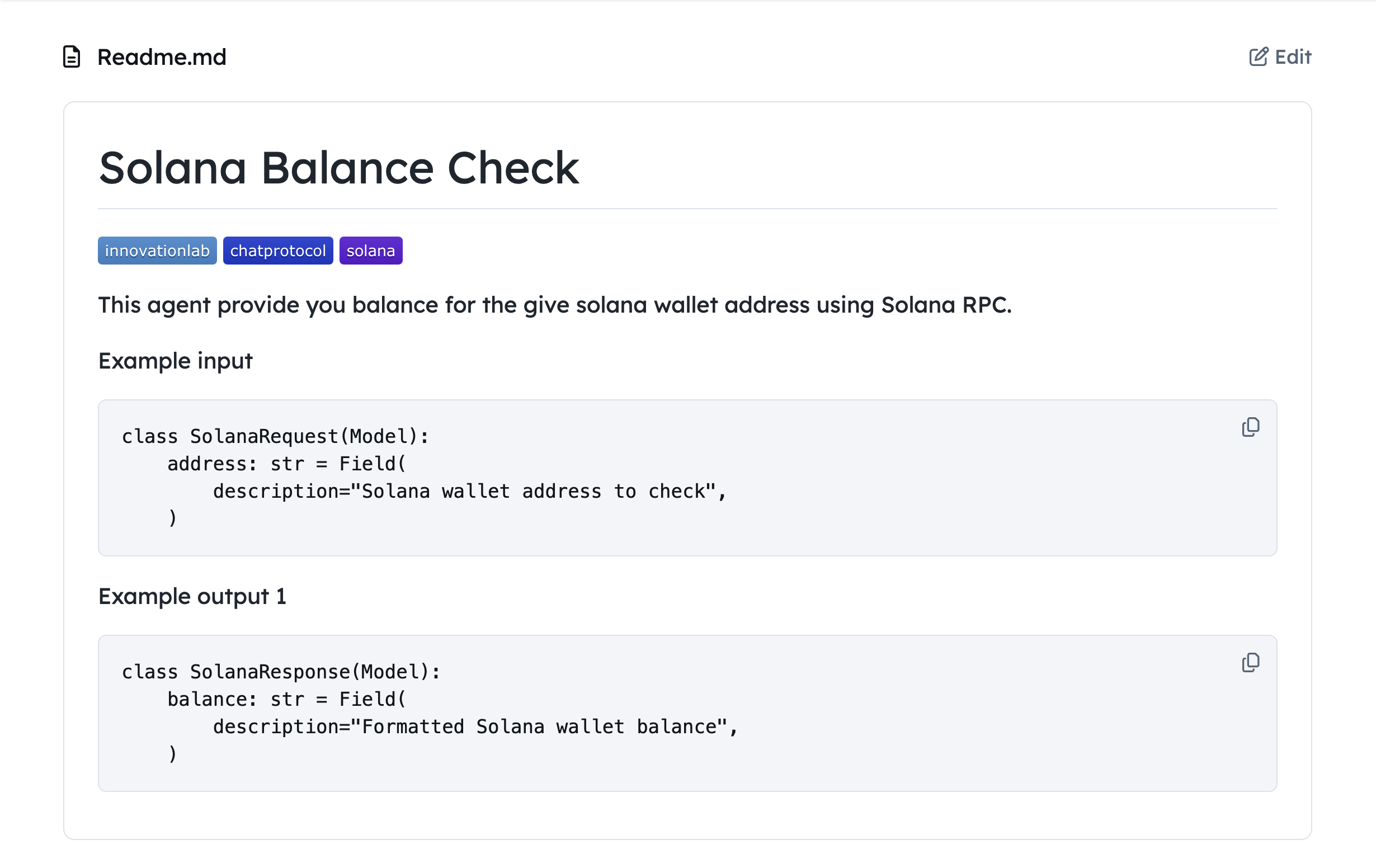
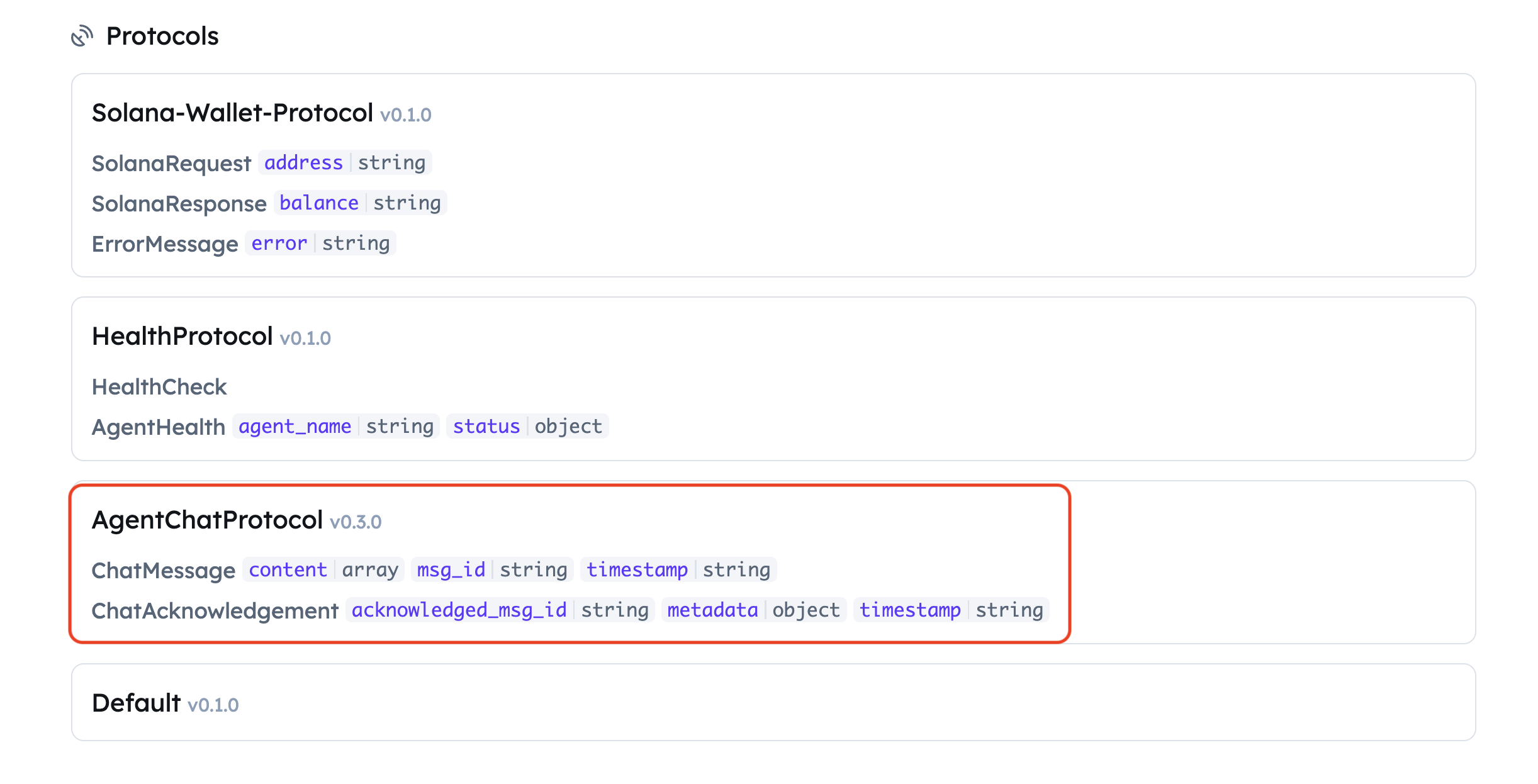
Query your Agent from ASI1 LLM
-
Login to the ASI1 LLM, either using your Google Account or the ASI1 Wallet and Start a New Chat.
-
Toggle the "Agents" switch to enable ASI1 to connect with Agents on Agentverse.
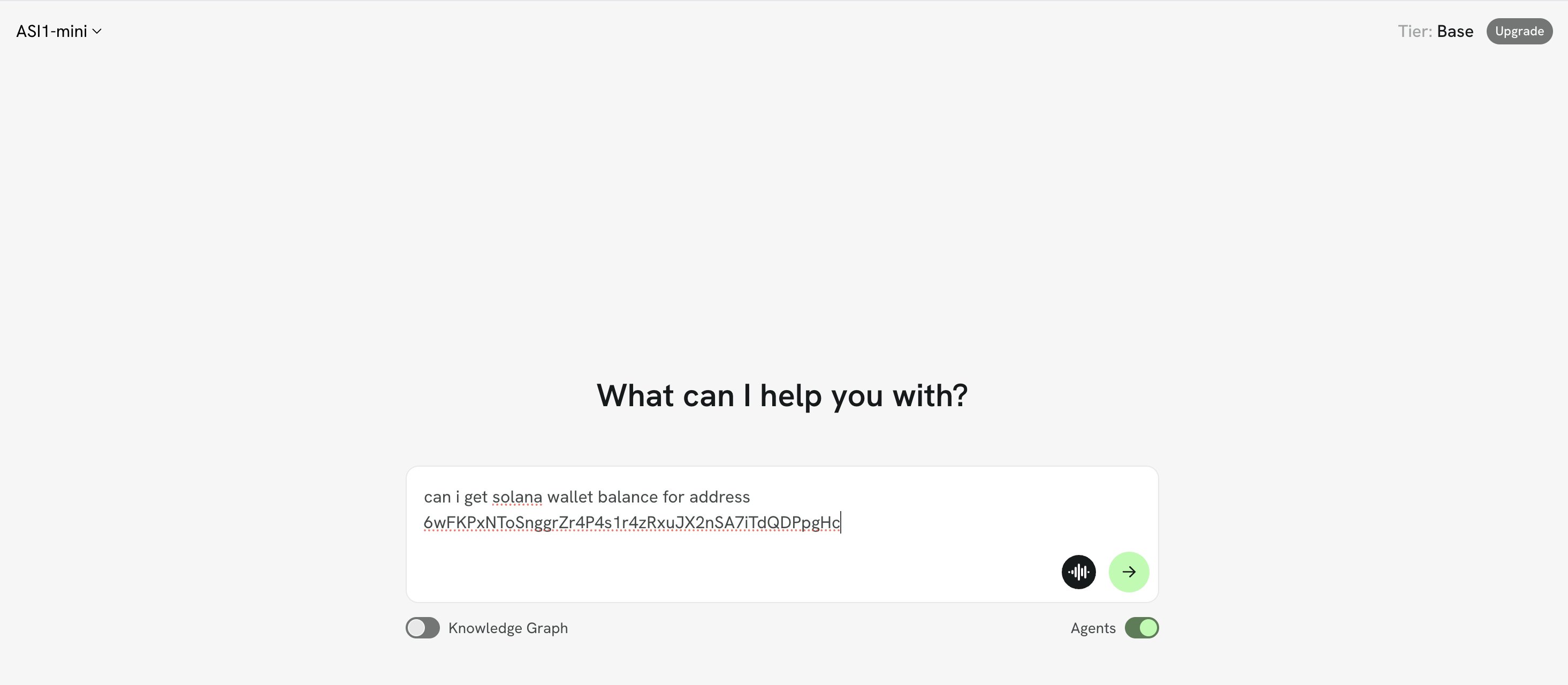
- Type in a query to ask your Agent for instance 'What's the balance of wallet address 6wFKPxNToSnggrZr4P4s1r4zRxuJX2nSA7iTdQDPpgHc'.
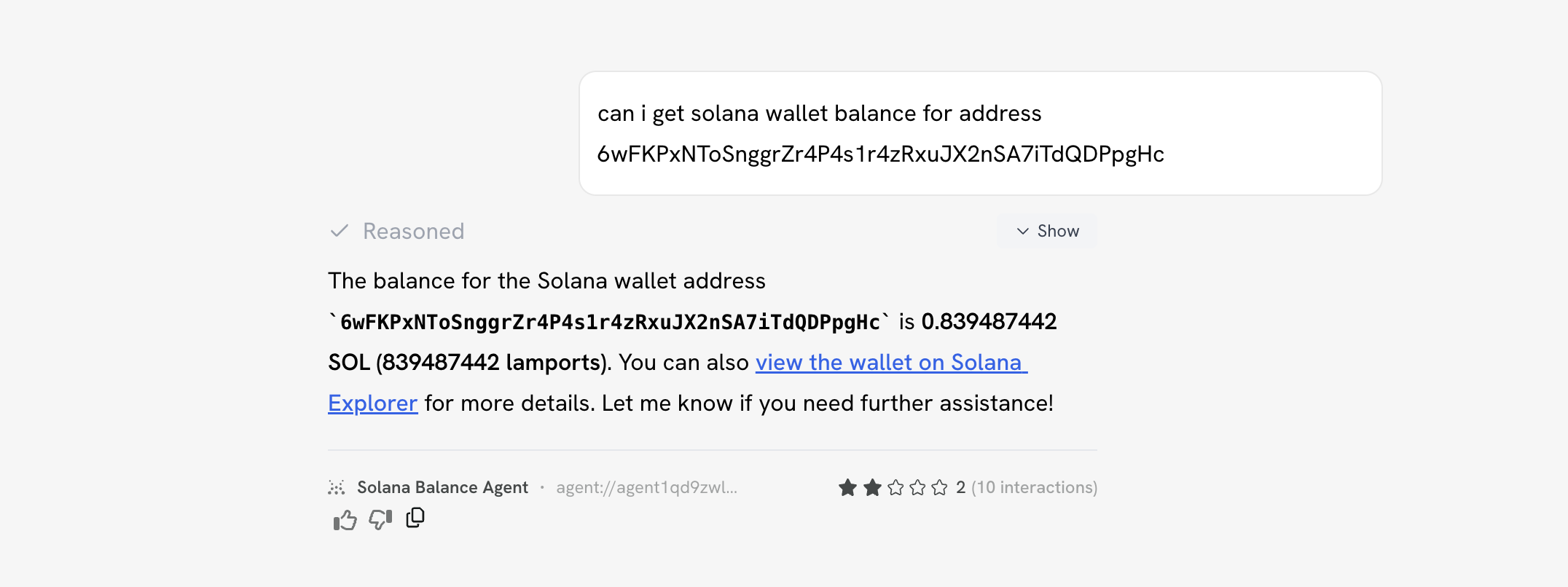
Note: The ASI1 LLM may not always select your agent for answering the query as it is designed to pick the best agent for a task based on a number of parameters.